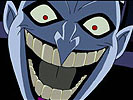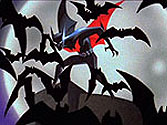|
 Where
to start when talking about a great film like Return of the Joker? Where
to start when talking about a great film like Return of the Joker?
With the smooth,
beautifully animated action sequences—fireballs that puff and bloom
like monstrous flowers, waves of ocean spray that practically wet the
screen, fight scenes where the combatants dance and weave like pugilists
possessed by the spirit of Fred Astaire?
Maybe with the taut
story that brings old allies and ancient adversaries back from the grave
in always surprising ways; that piles demented revelation upon insane
plot twist; that pushes characters into corners that we'd thought—that
we'd prayed—they'd never see, and does so without once snapping the
thread of plausibility that has for decades given these characters a life
and hold on our imaginations?
Or perhaps with the
fabulous acting by all the principals: Will Friedle, who gives Terry McGinnis
the gravity to stand up to Bruce Wayne and the brass to out-sass the Joker.
Kevin Conroy, who finds in an incremental shade of delivery the difference
between the Batman in his prime and a guttering, guilt-ridden old man.
Not least Mark Hamill, whose Joker is still plausible as the Clown Prince
of Crime, but who here is also something far darker and malicious, a Lecter
in greasepaint. And Dean Stockwell, a voice of weary, undischarged agony.
These are not virtues
peculiar to Return of the Joker—the visuals and vocal performances
are present too in other episodes of Batman Beyond. But even at
its best, the various Batman shows have been retarded by a certain
inwardness of direction: grand stories like "Out of
the Past" or "Over the Edge" have resonated
chiefly because of what we know about Batman and his circumstances and
are liable to puzzle those viewers not conversant with that universe.
Return of the Joker has something of the same handicap, though
with its greater running time it can fill in many details that the casual
viewer might miss but which the experienced viewer could take for granted.
Yet it also possesses an arc that allows it to escape definition as "just"
a Batman story.
Family and unexpiated
guilt—the stuff of classical tragedy—are the grand themes dealt
with in this story. From the Joker's exercise in cradle-snatching to Terry's
discovery of a "Ha-Ha" defaced Bat-cave (recalling the scene
when his own father was killed), the film strikes notes that remind us
that Bruce Wayne, orphan, has dedicated himself not only to fighting crime
but to rebuilding a family with himself as the father figure. That is
what makes the Joker's crime against Robin such a subtle and devastating
thrust. In making a family of his own, Bruce has unwittingly given a villain
like the Joker a potential hostage and has endangered a person (Tim Drake)
who otherwise would never have been victimized in this brutal way. And
in remaking Tim in his own gruesome image, the Joker not only mocks Batman's
pretensions to mold the youngster, but plants a corrosive thought: Is
Bruce any better for turning Tim into "Robin," or has he warped
Drake just as thoroughly as the Joker has?
That's the seed of
guilt which takes almost immediate root, even if the poisonous fruit isn't
plucked until decades later. It's a guilt which is only glancingly alluded
to in the course of the film, but on which pivots the entire story, for
it is what prevents Bruce from forestalling a tragedy that takes forty
years to unfold. The brainwashed Robin, you see, breaks through the conditioning
at the flashback's climax and kills the Joker. But that doesn't end the
Joker's plot, for he has placed on Drake a microchip which carries his
own fiendish personality and DNA, and over the years he gradually takes
form again in Drake's body. Of course, it is true that in killing the
Joker Tim has morally compromised himself—he has taken on some of
the Joker's character—and that the gnawing (even if unacknowledged)
guilt of the past has probably made Tim an easier conquest for the Joker's
waxing spirit. But it is simply incredible to believe that Bruce would
have missed the chip if he had kept Tim in his care. Instead, wracked
by guilt and unable to face consequences which he blames on himself, he
fobbed Tim off on Leslie Thompkins—a character unsullied by the same
compromises.
It's the same spirit
that leads Bruce to coldly "fire" Terry as Batman when the Joker
returns—he cannot bear to think that he might send another young
man to his ruin. Fortunately, Terry (who is trying to expiate the sins
of his own past) refuses to take the hint. That marks the turning point—Bruce,
Barbara and Tim have been too traumatized by the past to respond effectively
to the Joker's new challenge, so the "new guy" has to step in.
He is aided immeasurably by the Joker's refusal to take him seriously;
having finally bested the old man, he cannot believe that this sidekick,
this "punk," could be a genuine challenge. But Terry is no mere
tag-along, but the person groomed to be the new Batman. And when Bruce
finally gives him whole-hearted support, he repays Wayne's faith by proving
that he can stand up to and beat the monster that had beaten even the
old man.
Put bluntly, Bruce
is redeemed by Terry, by the fact that he has finally done what he could
not do with Dick Grayson or Barbara Gordon or—most tragically—Tim
Drake. He has let Terry mature and achieve an independent existence as
Batman, has let him be a "new" Batman, and has supported and
encouraged him. Where previously he has dominated and suppressed his compatriots
to the point where they rebelled or were ruined, he has let Terry grow
in his own fashion and according to his own needs—guiding and correcting
and supplementing, to be sure, and sometimes doing it with a heavy hand—but
with the ultimate aim of letting Terry be his own kind of Batman. And
that is how Terry is able to beat the Joker: expecting a Batman clone,
the Joker-possessed Drake is utterly routed by something new. And it is
in this metaphor for fatherhood—the sustaining creation of something
different from one's self, rather than its recapitulation—that the
story is able to stand as something above and beyond the mere telling
of a new "Batman" adventure. Fathers create sons; they don't
re-create themselves.
Not that it doesn't
work on the level of "Batman adventure," too. Batman is a backwards-looking
character, one whose entire being is colored by the fact that he is an
orphan who has built his entire existence around that fact. Not the least
of ROTJ's achievement is the way it turns this conservative creature around
and recasts him as a figure with conscious duties owed, and ultimately
fulfilled, to his progeny and not just his parents. That this is only
a bonus is further evidence of the film's depth and power.
The above discussion
applies mostly (though not solely) to the original, uncut version of Return
of the Joker released in 2002. A studio cut released in 2000 changed
the vital flashback in ways that greatly diminished its impact and the
film's overall dramatic architecture. For a discussion of those changes,
see the essay Killing the Joker at this
site and Alex Weitzman's Supplementary
Essay #2 at Rotten Tomatoes.
For a full and frank discussion of the film—and an experience almost
(though not quite) as entertaining as ROTJ itself—buy or rent the
DVD and listen to Timm, Dini, Murakami and Geda on the commentary track.
|

 Return
of the Joker
Return
of the Joker Where
to start when talking about a great film like Return of the Joker?
Where
to start when talking about a great film like Return of the Joker?